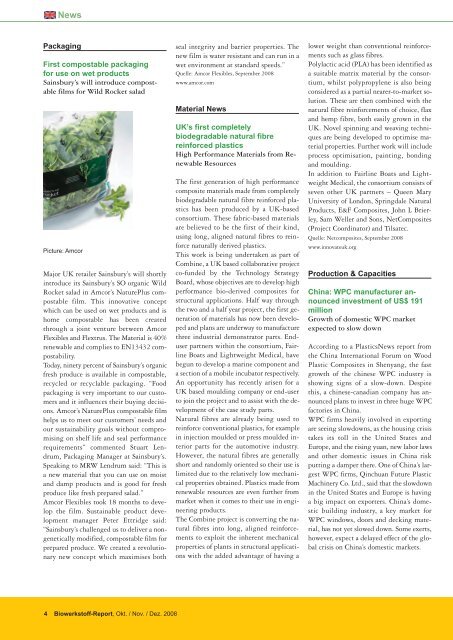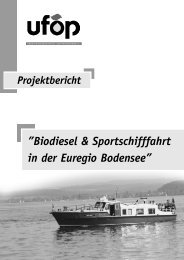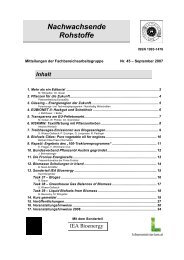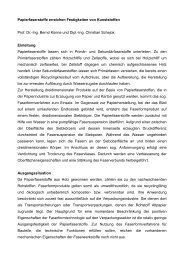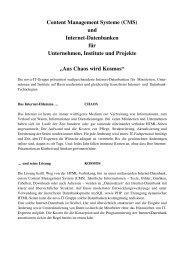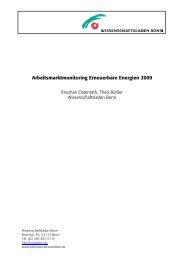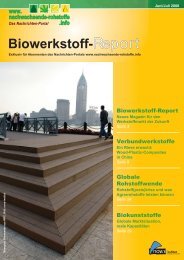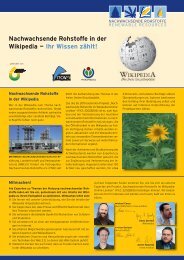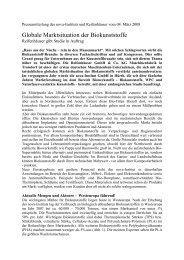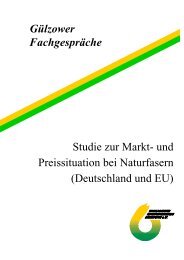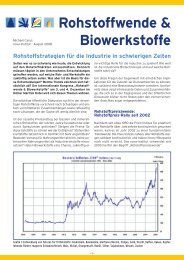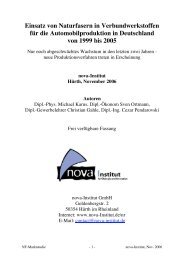Biowerkstoff-Report - nova-Institut GmbH
Biowerkstoff-Report - nova-Institut GmbH
Biowerkstoff-Report - nova-Institut GmbH
Sie wollen auch ein ePaper? Erhöhen Sie die Reichweite Ihrer Titel.
YUMPU macht aus Druck-PDFs automatisch weboptimierte ePaper, die Google liebt.
News<br />
Packaging<br />
First compostable packaging<br />
for use on wet products<br />
Sainsbury’s will introduce compostable<br />
films for Wild Rocket salad<br />
Picture: Amcor<br />
Major UK retailer Sainsbury’s will shortly<br />
introduce its Sainsbury’s SO organic Wild<br />
Rocket salad in Amcor’s NaturePlus compostable<br />
film. This in<strong>nova</strong>tive concept<br />
which can be used on wet products and is<br />
home compostable has been created<br />
through a joint venture between Amcor<br />
Flexibles and Flextrus. The Material is 40%<br />
renewable and complies to EN13432 compostability.<br />
Today, ninety percent of Sainsbury’s organic<br />
fresh produce is available in compostable,<br />
recycled or recyclable packaging. “Food<br />
packaging is very important to our customers<br />
and it influences their buying decisions.<br />
Amcor’s NaturePlus compostable film<br />
helps us to meet our customers’ needs and<br />
our sustainability goals without compromising<br />
on shelf life and seal performance<br />
requirements” commented Stuart Lendrum,<br />
Packaging Manager at Sainsbury’s.<br />
Speaking to MRW Lendrum said: “This is<br />
a new material that you can use on moist<br />
and damp products and is good for fresh<br />
produce like fresh prepared salad.”<br />
Amcor Flexibles took 18 months to develop<br />
the film. Sustainable product deve -<br />
lopment manager Peter Ettridge said:<br />
“Sainsbury’s challenged us to deliver a nongenetically<br />
modified, compostable film for<br />
prepared produce. We created a revolutionary<br />
new concept which maximises both<br />
4 <strong>Biowerkstoff</strong>-<strong>Report</strong>, Okt. / Nov. / Dez. 2008<br />
seal integrity and barrier properties. The<br />
new film is water resistant and can run in a<br />
wet environment at standard speeds.”<br />
Quelle: Amcor Flexibles, September 2008<br />
www.amcor.com<br />
Material News<br />
UK’s first completely<br />
biodegradable natural fibre<br />
reinforced plastics<br />
High Performance Materials from Renewable<br />
Resources<br />
The first generation of high performance<br />
composite materials made from completely<br />
biodegradable natural fibre reinforced plastics<br />
has been produced by a UK-based<br />
consortium. These fabric-based materials<br />
are believed to be the first of their kind,<br />
using long, aligned natural fibres to reinforce<br />
naturally derived plastics.<br />
This work is being undertaken as part of<br />
Combine, a UK based collaborative project<br />
co-funded by the Technology Strategy<br />
Board, whose objectives are to develop high<br />
performance bio-derived composites for<br />
structural applications. Half way through<br />
the two and a half year project, the first generation<br />
of materials has now been developed<br />
and plans are underway to manufacture<br />
three industrial demonstrator parts. Enduser<br />
partners within the consortium, Fairline<br />
Boats and Lightweight Medical, have<br />
begun to develop a marine component and<br />
a section of a mobile incubator respectively.<br />
An opportunity has recently arisen for a<br />
UK based moulding company or end-user<br />
to join the project and to assist with the development<br />
of the case study parts.<br />
Natural fibres are already being used to<br />
reinforce conventional plastics, for example<br />
in injection moulded or press moulded interior<br />
parts for the automotive industry.<br />
However, the natural fibres are generally<br />
short and randomly oriented so their use is<br />
limited due to the relatively low mechanical<br />
properties obtained. Plastics made from<br />
renewable resources are even further from<br />
market when it comes to their use in engineering<br />
products.<br />
The Combine project is converting the natural<br />
fibres into long, aligned reinforcements<br />
to exploit the inherent mechanical<br />
properties of plants in structural applications<br />
with the added advantage of having a<br />
lower weight than conventional reinforcements<br />
such as glass fibres.<br />
Polylactic acid (PLA) has been identified as<br />
a suitable matrix material by the consortium,<br />
whilst polypropylene is also being<br />
considered as a partial nearer-to-market solution.<br />
These are then combined with the<br />
natural fibre reinforcements of choice, flax<br />
and hemp fibre, both easily grown in the<br />
UK. Novel spinning and weaving techniques<br />
are being developed to optimise material<br />
properties. Further work will include<br />
process optimisation, painting, bonding<br />
and moulding.<br />
In addition to Fairline Boats and Lightweight<br />
Medical, the consortium consists of<br />
seven other UK partners – Queen Mary<br />
University of London, Springdale Natural<br />
Products, E&F Composites, John L Brierley,<br />
Sam Weller and Sons, NetComposites<br />
(Project Coordinator) and Tilsatec.<br />
Quelle: Netcomposites, September 2008<br />
www.in<strong>nova</strong>teuk.org<br />
Production & Capacities<br />
China: WPC manufacturer announced<br />
investment of US$ 191<br />
million<br />
Growth of domestic WPC market<br />
expected to slow down<br />
According to a PlasticsNews report from<br />
the China International Forum on Wood<br />
Plastic Composites in Shenyang, the fast<br />
growth of the chinese WPC industry is<br />
showing signs of a slow-down. Despite<br />
this, a chinese-canadian company has announced<br />
plans to invest in three huge WPC<br />
factories in China.<br />
WPC firms heavily involved in exporting<br />
are seeing slowdowns, as the housing crisis<br />
takes its toll in the United States and<br />
Europe, and the rising yuan, new labor laws<br />
and other domestic issues in China risk<br />
putting a damper there. One of China’s largest<br />
WPC firms, Qinchuan Future Plastic<br />
Machinery Co. Ltd., said that the slowdown<br />
in the United States and Europe is having<br />
a big impact on exporters. China’s domestic<br />
building industry, a key market for<br />
WPC windows, doors and decking material,<br />
has not yet slowed down. Some exerts,<br />
however, expect a delayed effect of the global<br />
crisis on China’s domestic markets.


